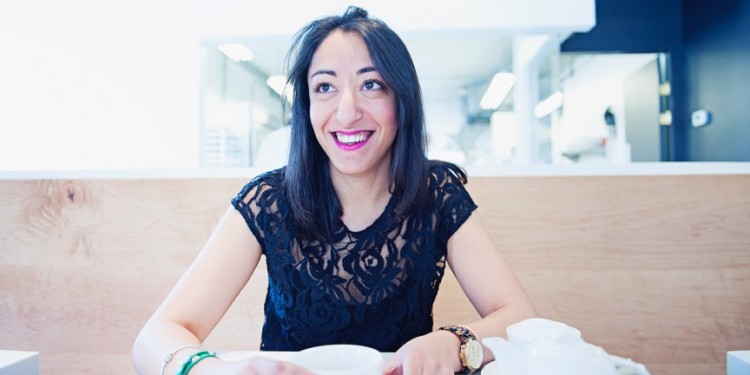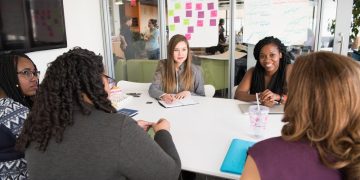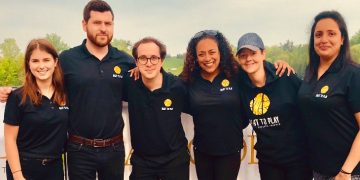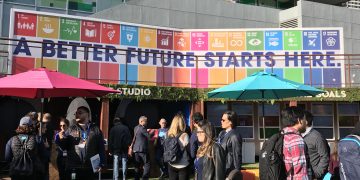Zahra Ebrahim. Founder and Principal. ArchiTEXT
Don’t wait for permission to create the change or job you want. That is one of the many life lessons we can learn from Zahra Ebrahim, founder and principal of ArchiTEXT- a design think tank and consultancy focusing on design based approaches to social innovation for government, charities and philanthropic organizations. Zahra’s enthusiasm and fresh thinking have helped build her career to where it is today- and it’s only just begun.
What does your job entail including what a typical day might be like?
The thing I love about what I do is the variety. My role as Principal of the organization requires me to advocate for the work – design-based innovation for the social and public sector – in as many different ways as possible, so it means that the constitution of my days are often quite varied. On some days I’m taking on the role as spokesperson for this kind of approach to changemaking, speaking at government forums, conferences, at organization’s offices, and at events. That role can also look like being in the gym of a small community center in an inner suburb in Toronto, speaking to a handful of residents or community workers. On other days, I’m supporting our team to think through our approach to the work, which means long days in the studio covering the wall with post-its and “method cards” that describe a way of approaching the challenge, and wading through the information we have to draw out insights on the problem we’re exploring. On other days it requires me to be in meeting after meeting, connecting with individuals and organizations that may not fit neatly into our mandate, but could serve as supportive allies and partners should the right opportunity emerge. My days take me to different cities, different spaces, and require me to find many different ways of sharing what we do so as to have it resonate and inspire others. (And of course, what would a typical day be without a LOT of email!).
Can you briefly describe your career path and how you got your current job?
I’m going to wade into clichés here, and suggest that my journey felt less like it moved along a path and more like hopping from rock-to-rock as you cross a river, or a creek. My career path started when I left my undergraduate degree, was applying for a masters degree in architecture, and was applying for jobs in the field. Nothing quite fit, and the profession I was seeking didn’t exist. Instead of waiting for the permission to charge ahead, I granted it to myself, and decided to embark on building the career (and frankly, the sector) that I wanted to work in. I started our organization, archiTEXT – a design think tank and consultancy focusing on design based approaches to social innovation for government, charities and philanthropic organizations – at a time right before every 22 year old was a CEO, and right before the design thinking movement really gained momentum. Being passionate and forthcoming, I told anyone that would make eye contact with me about the organization that I was starting and the opportunity that we had to make change for these institutions. When social innovation and design thinking gained momentum as a way to approach the most complex challenges we face, I had the good fortune of having been the voice that had been advocating for it, and our organization became the Canadian destination for those looking to use design-based approaches.
What’s the coolest part about your job and what’s the biggest challenge?
I don’t yet have children myself, but there seems to be some parallels between “raising” an organization and raising children. The coolest part of my job over the last decade is for the first six years, every year was dramatically different. We were breaking new ground, maintaining momentum, enjoying crazy wins, and navigating spaces that made us unsure of our role or capacity. Now that the organization is (almost) ten years old, it feels like it is starting to develop an independence, a personality, and a role that doesn’t rely on such close care. That in itself has been incredible to be a part of. However, if you were to ask me the coolest part of my job I would say that in the work I do, working closely with both a nine-year old from a Neighbourhood Improvement Area and the Executive Director of a national non-profit organization are equally critical to my success. Not just working with them, but having them both at the decision-making table is key to having impact in our work. We get to work at great tables.
The biggest challenge is that the sector is new, it’s young, and at times can be fickle. Design thinking became a movement so fast that organizations don’t know how to filter high quality offerings from more superficial ones. Because design-based innovation is so young in Canada, we need to work hard to ensure that both we and our peers offering these services are working with organizations with a commitment to following through on using the approach to approach big challenges. Too often Design Thinking is relegated to the professional development space.
What advice would you give to a job seeker looking for meaningful work?
Don’t ask, don’t get. If you wait for someone to give you the invitation or permission to make bold change, it’s likely not going to come. Practice empathy when sharing your vision for meaning and change, consider what the employer needs, and what you need, and find a way to share your ideas in a way that honours both.
But don’t wait for the permission to do so.
What can you identify as the biggest opportunity in your sector right now?
We need more of what I like to call “sector intrapreneurs”. People that are willing to commit to using new approaches in specific sectors, and committing to staying in those spaces even when they refuse to change.
Like what Zahra has to say? Follow her on twitter: @zahraeb
Or go see her at TEDxToronto 2015– Zahra was recently announced as one of the speakers!





2 Comments
Really interesting interview. Thank you.
I enjoy Zahra’s bucking of ‘permission’, her embracing of design-thinking, and that she mentioned ’empathy.’
I looked for more from Zahra outside her TEDTalks and am glad bmeaningful.com share this. 🙂
[…] Source: Bmeaningful […]